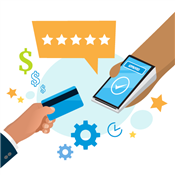PaymentCloud Review
Find out the true value of PaymentCloud for merchants (including high risk businesses). Read the pros and cons before you commit.
 | |||
High Risk? No Problem | |||
Overall Score | 4.0 | ||
Equipment | 4.0 | ||
Contract | 3.5 | ||
Customer Service | 4.0 | ||
Ecommerce | 4.5 | ||
High Volume Business | 5.0 | ||
Low Volume Business | 3.5 | ||
Pricing Model | 3.5 | ||
Pros and Cons
- Supports up to 3% chargeback ratio
- Customized payment solutions
- Dedicated account manager
- Underwriting process
- No disclosed fees
- Potential long-term contract
Bottom Line
Trusted merchant account provider for low to high-risk businesses
PaymentCloud can help any business. Whether you're a high-risk business looking for a merchant account or a small business looking to grow via business loans, they've got something for you.
Whatever you're after, this review will let you know whether or not their services are worth it. If PaymentCloud's services aren't up to par, there are also alternatives at the end.
What is PaymentCloud?
PaymentCloud is a merchant account provider that offers payment processing services. They allow you to work with online, mobile, ACH, eChecks, cryptocurrency payments, and more.
PaymentCloud also supports low-risk, mid-risk, and high-risk businesses. That means they specialize in a large number of industries, such as home goods and e-commerce.
Pros and Cons
 |
Although PaymentCloud is one of the best payment processors, it has its upsides and downsides.
Pros:
- Multiple customized payment processing solutions
- Supports a wide variety of industries
- Dedicated account manager for your business
- Accepts a chargeback ratio of up to less than 3%[1]
- Volume increase can be requested every 3 months[2]
Cons:
- Needs an underwriting process
- Monthly volume limit
- Potential for increasing rates
- Not for ultra-high-risk businesses
PaymentCloud is not a payment gateway. But since it's a merchant services provider, it integrates with payment gateways to offer the processing services you need. Some payment gateways it works with include Authorize.Net, USAePay, Payeezy, and PayTrace.[3]
Although it's a great merchant account provider, PaymentCloud may not be for everyone. Keep reading to learn more.
Who is PaymentCloud For?
Whether PaymentCloud is for you or not will depend on your business needs. Just make sure that you're in one of the industries they support before you apply.[4]
| Low-risk Businesses | Medium-risk Businesses | High-risk Businesses |
|---|---|---|
| Apparel | eCommerce Subscription | Adult Products |
| Home Goods | Accounting | Bail Bonds |
| Moving Companies | Drop Shipping | Guns & Firearms |
| Parking Garages | Document Preparation | Nutraceuticals |
| Pet Supplies | High Volume | Tech Support |
| Beauty Products | Property Management | Dating Sites |
| Books, CD's, DVD's | SEO Services | Cigars & Tobacco |
| Auto Parts | Web Design | Jet Charter |
Here are some of what you can get based on your risk level:
- Low-risk Businesses
PaymentCloud supports low-risk merchants in the retail industry. They offer various POS systems and terminals together with credit card processing.You can try them out if you're selling clothing, beauty products, books, home goods, and the like.
- Medium-risk Businesses
Medium-risk businesses include e-commerce stores. If your business has one, PaymentCloud offers shopping cart integrations and recurring billing features.[5]Some of the industries they support include dropshipping, SEO, web design, accounting, and high-volume industries.
Online stores are riskier than physical stores since customers make card-not-present transactions. Fraud is easier to commit with these transactions; hence, your business can be considered medium-risk. - High-risk Businesses
High-risk businesses know the struggle of finding a merchant account provider. But PaymentCloud isn't too picky, even if you have had a failed business or bad personal credit.Some high-risk industries they support include adult products, nutraceuticals, and cigars and tobacco.
High Risk? No Problem
- Competitive Options for Payment Processing at All Risk Levels
- Fast Funding
- No Setup/Hidden Fees
- No Minimum Credit Score
- All Industries Accepted
Now that you know who PaymentCloud caters to, let's talk about the services it offers.
PaymentCloud Services
Here's a summary of the payment solutions you can get with PaymentCloud:
- Online (eCommerce)
- Retail (brick-and-mortar stores)
- MOTO (Mail and Telephone Order)
- Mobile
- ACH
- eCheck
- Cryptocurrency
- Zero cost processing (no-fee processing)
You can accept credit cards, debit cards, ACH, eChecks, and cryptocurrency payments depending on your account type. There are also multiple payment gateway options for you to choose from.
Credit Card Processing Services
You can typically access these payment processing solutions in one merchant account:
- Online Credit Card Processing
Online credit card processing is suitable for e-commerce merchants. You can integrate your merchant account with payment gateways and shopping carts to accept payments.Some examples you can work with include Shopify, WooCommerce, and BigCommerce. But overall, there are over 100 integrations to choose from.
- Retail Credit Card Processing
These are best for businesses with physical locations. Choose from wired, wireless, and contactless solutions to take in-person card payments.Depending on your point-of-sale system, you'll be able to take payments through chip cards, magstripe cards, or QR codes.
- Mobile Credit Card Processing
PaymentCloud offers many solutions for mobile credit card processing—text-to-pay, scan-to-pay (using QR codes), and email links. You can also use wireless terminals, virtual terminals on your phone, and chip card readers.With text to pay, payment links are sent to your customers' phones. They can pay as soon as they get the message. - Mail and Telephone Order
Mail and telephone orders are mostly used by B2B businesses. You can use the virtual terminal to take keyed-in payments. The automatic billing feature can even help you save time and headspace for your regular clients.Some of the suitable industries for MOTO include accounting firms, hotel booking, and nonprofit organizations. It can also work for high-ticket and high-volume businesses—think wholesale retailers or suppliers. - ACH Processing
ACH processing fees can be more affordable than that of credit cards. You receive instant verification from your bank account regarding the transfer, which can make it more reliable.Plus, you can inform your customers right away if you've received the payment.
Pro tip: PaymentCloud is actually one of the best ACH payment processors. It's suited even for high-risk businesses. - eCheck Processing
If your business still accepts paper checks, you can think about switching to eCheck payments. PaymentCloud will help you set up a secure eCheck account on your e-commerce platform. - Cryptocurrency Processing
Even if you don't know anything about crypto, PaymentCloud can help you understand how to work with them. Start taking Bitcoin, BitcoinCash, Chainlink, Ethereum, and more to get lower processing fees and no chargeback risks.Cryptocurrencies present their own benefits as a mode of payment. For one, it can provide more privacy for your customers since transactions may not include actual names. It can be especially helpful if you're an adult entertainment business, for example. - Zero Cost Processing
PaymentCloud offers zero cost, or no-fee credit card processing. This lets you offset the cost of processing credit cards to customers through surcharges.You'll have a month-to-month contract with this type of account. And your card terminal with PaymentCloud will already be surcharge-compliant.
When processing credit card payments, you can receive the money in your bank account typically after 1-2 business days. Or you can opt for PaymentCloud's next-day funding.
PaymentCloud Features
Dedicated Account Manager and Same-day Setup
PaymentCloud gets you a dedicated account manager, which means you'll be getting the help you want when you need it.
Your dedicated account manager will already be there to help you with the approval and underwriting process. He or she will also work with you in setting up your account, so you can start accepting payments as soon as possible.
Next-day Funding
As long as you batch out your transactions on time, you'll be able to receive your funds the next day. This can be a great help when managing your cash flow.
Full PCI-compliance
PaymentCloud's virtual terminals and other hardware and software are PCI-compliant, so you don't have to worry so much about requirements.
Chargeback Protection and Prevention
PaymentCloud has plenty of chargeback prevention tools at your disposal. For example, you can automatically detect disputes as soon as you receive them. This can prevent up to 25% of chargebacks.
You can also set alerts by type of card, month, and location. This can help you better analyze the cause of these disputes. With the Cause Analyzer, you can also take note of specific causes like duplicate billing, refund not issued, call center error, etc.
To keep your business transactions healthy, you can set up threshold filters as well. This can help you get an overview of your chargeback ratio and chargeback quantity.
Chargeback and fraud prevention tools (more info in the next section) go hand-in-hand. Here are the common chargeback reasons and fraud you can potentially solve or avoid:
| Mistakes Made by Merchants | Friendly Fraud | Criminal Fraud |
|---|---|---|
| Late deliveries or product not received by the customer | Buyer's remorse | Stolen card information used |
| Damaged, defective, or incomplete items | Family member used the card without the consent of the owner | Buyers intend to get products for free (cyber shoplifting) |
| Incorrect amount charged or customer has been charged twice | Customer forgets to cancel a subscription | |
| Actual product did not live up to the given descriptions | Customer unrecognized the transaction |
Fraud Prevention Tools
PaymentCloud also has a set of fraud prevention tools in its arsenal, so you can detect and prevent common fraud techniques.
For example, you can track consumer data to understand how fraud is happening and who's responsible for it.
You can also set up temporary payment halts to briefly stop suspicious payments from going through. You can then validate or deny the transaction after review.
Other security features include:
- Address Verification System (AVS)
- Card Verification Value (CVV)
- Personal Identification Number (PIN)
- Tokenization
- IP Tracking
- Volume Filters (set a limit on the transactions you process)
Now, all these features are fine and dandy. But how much will it cost you? Keep scrolling.
PaymentCloud Pricing and Contract
PaymentCloud doesn't explicitly state its fees on its website since it offers customized solutions for businesses. Your rates will depend on your business type (industry and risk level).
The average credit card processing fee ranges from 1.5% to 3.5%. But here are specific averages you can use as a starting point:
| Average Interchange Rates[6] | |
|---|---|
| Card-not-present Transactions | 1.60% + $0.10 to 2.60% + $0.15 plus processor markup |
| Card-present Transactions | 0.10% + $0.10 to 2.35% + $0.10 plus processor markup |
You can also expect a transaction fee of around $0.10 to $0.25. This is charged for all transactions, whether approved or declined.
If you're offered flat-rate pricing, here are the following averages depending on the risk level of your business:
| Average Flat Rates Per Risk Type[6] | |
|---|---|
| Low-risk Businesses | 1.7% + $0.10 per transaction |
| Mid-risk Businesses | 2.95% + $0.25 per transaction |
| High-risk Businesses | 3.95% + $0.25 per transaction |
In determining your rates, PaymentCloud will likely take note of your processing history (if any), credit history, sales volume, chargeback ratio, and merchant category code (MCC).
They will also consider your accepted mode of payment since this affects your level of risk.
As you can see from the averages, PaymentCloud offers more than one pricing model. Here's what you can expect from the processor.
Pricing Model
With PaymentCloud, you may be offered:
- Interchange-plus Pricing
This pricing model shows exactly how much you're paying for interchange rates, card brands, and markup. It's the most transparent pricing model and is typically more affordable than flat-rate pricing. - Flat-Rate Pricing
This is the most predictable model, given that you'll be paying a flat fee. It makes budgeting easier. However, it also takes away the transparency of how much you're paying to card brands, banks, and processors. - Tiered Pricing
In this model, there are three flat fees to take note of. The amount you pay depends on the payment type. And these payments are categorized into qualified, mid-qualified, and non-qualified, with qualified payments being the most affordable.[7]
Other fees you may encounter
Processing fees aren't the only cost of a merchant account. There are other typical fees a credit card processor may charge.
Here are the other fees PaymentCloud may ask of you:
- Early termination fees
- PCI compliance fee
- PCI non-compliance fee
- Account on file fees
- Statement fees
- Batch fees
- Chargeback fees
- Reserve accounts
There could be a monthly minimum fee of $5.00. But with tiered pricing, mid- and non-qualified fees are not included in your monthly minimum. Payment gateway fees can range from $20 to $25/mo,[8] while virtual terminal fees average $10 to $30/mo.[9]
In addition, chargeback fees can range from $25 to $50,[10] while the average rolling reserve is 10%.[11]
Unfortunately, if you cancel your contract, you can be charged around $200 to $600 for the cancellation fee.[12]
PaymentCloud merchant services have no setup fees. If you want accurate processing rates and a list of fees they charge, you'll have to contact them for a quote. Your rates will depend on your business type. Hence, they don't state these fees on their website.
Aside from fees, there are other expenses you need to budget for, such as your POS equipment.
PaymentCloud Hardware and Software
PaymentCloud doesn't directly provide the hardware and software you'll work with. They're only a merchant services provider. That said, they do work with over 100 partners.[13]
Some of the services you can get include:
- Payment gateway
Payment gateways are essential for taking in-person and online payments. Some payment gateways PaymentCloud works with include Authorize.net, NMI, and USAePay. - Virtual terminal
If you don't have a physical store, then you may not need hardware at all. Virtual terminals can help you take card-not-present transactions right from your device. - Online shopping cart
There are online shopping carts that are free to use. But note that they won't have the functions of a paid shopping cart integration. Some shopping carts PaymentCloud offers include Shopify, WooCommerce, and BigCommerce. - POS System
Whether it's a full point-of-sale system you need or just a card reader, PaymentCloud can help you out. Some providers you can work with include Clover, Verifone, and Ingenico.
Contact and Customer Support
PaymentCloud will guide you through the process of setting up your account and choosing the right partners or integrations. You'll get a dedicated account manager, which is a lot more helpful than a FAQ page.
They're very hands-on with their support. And this merchant support is available 24/7.
You can visit the PaymentCloud website to ask for a free quote and apply.
We'd recommend applying directly to PaymentCloud. They do have agents who work with them but they're typically paid through commission, so you may end up getting more expensive offers.
It's time for the final verdict. Is it worth it to apply?
Is PaymentCloud Worth It?
PaymentCloud is a well-established merchant services provider. We've even rated them the best overall in our analysis for the best high-risk payment processors.
Although they do have their pros and cons, the benefits do outweigh the downsides.
Why we recommend it:
Unlike other merchant account providers, PaymentCloud offers a handful of payment processing services and business loans.
They're also not limited to low-risk businesses, unlike traditional processors. If you're a high-risk retail merchant, you may even get your first terminal for free.
While other popular payment processors like Stax and Square do post their fees online, this also means that you may miss the chance to get more affordable rates. With PaymentCloud, there's plenty of room to negotiate.
PaymentCloud Reviews:
PaymentCloud is a legitimate merchant services provider with excellent Trustpilot rating. Many business owners report high satisfaction and even attest to great customer service.
Unfortunately, some do report an increase in their rates over time while other businesses experienced additional fees. Plus, not everybody gets the satisfying help they need.
You can trust that transactions are secure with PaymentCloud. Their terminals are PCI-compliant, and payment links are encrypted. They provide chargeback and fraud-prevention tools as well.
Let's say you do find PaymentCloud worth it. Here's how to get started with them.
How to Apply for a PaymentCloud Merchant Account
Start your application by filling out the form on their website. You'll be able to ask for a free quote.
Also, make sure to have your documents ready. Here are some of their requirements:
- Voided check or bank letter
- Business checking account
- Recent business or personal bank statements (3 months)
- Previous processing statements (if any)
- Less than 3% chargeback ratio
- Business licenses
- EIN or SSN
- Certificate of Formation
- Business address
- Other supporting business documents
- Security procedures
You'll need to provide a monthly volume limit suitable to your business. You can increase this limit every 3 months (as long as your account has limited chargebacks).
You don't need to maximize this amount. But you won't be able to process payments if you exceed the limit (excess funds may be held for a short time). For new businesses, PaymentCloud suggests a processing limit of $5,000 to $10,000.[14]
If, however, you find that PaymentCloud isn't worth it, or is not what you're looking for, there are alternatives.
Alternatives to PaymentCloud
If you don't think PaymentCloud merchant services will work for you, there are other good options. You may also ask these providers for a quote to compare processing rates.
1. Stax for High-volume Businesses
If you want a price right off the bat, Stax is a transparent option. They offer subscription pricing starting from $99/mo for businesses processing up to $250,000 per year.[15]
If you process $250,000 to $500,000 per year, the subscription costs $199/mo. But if you're a large business processing over $500,000 per year, then you get to have custom pricing.
It's best for high-volume businesses because the subscription model may offer more savings. Stax still charges a small fee for every transaction. But you'll only pay the flat cost of processing without additional markup on top of interchange rates.
Save Up to 40%
- Flat Monthly Subscription Price, Starting at $99
- 0% Markup on Direct-Cost Interchange
- 24/7 Support
2. Clover for In-person and Online Businesses
Although PaymentCloud works with Clover, Clover offers merchant accounts, too. They offer various all-in-one solutions for different industries. You could be a full-service dining, retail store, or professional service.
Their pricing plans come with hardware and accessories, which can be convenient for brick-and-mortar stores. You have the option to purchase the hardware in full or pay monthly for it together with Clover software.
Some features you can get include inventory management, reporting, and a loyalty program. You can even opt for their cash flow services, which include cash advances.
3. Square for Small Businesses
Square doesn't actually offer merchant accounts. But it is a payment services provider that enables you to accept credit and debit card payments.
It's suitable for small businesses because there's a free plan to start. You only have to pay per transaction through the processing fees (in the form of flat-rate pricing).
You can even create your online store. It'll integrate well with your Square POS. You can upgrade to their paid plan if the free features aren't enough.
Square Reader: Free Mobile Credit Card Reader
- Pay 2.6% + 15¢ Per Swipe for Visa, Mastercard, Discover, and American Express
- Accept Credit Cards Anywhere
- Fast Setup, No Commitments
How We Evaluated PaymentCloud
There are a couple of things we looked at when making this PaymentCloud review. We believe these things are necessary to determine if PaymentCloud offers great service or not.
- Services offered
This comprised the bulk of our analysis. We wanted to analyze what they can offer to merchants of different business types and sizes. - Ideal merchants
After analyzing the services offered, we figured out who could best work with them or who can benefit the most from them. - Processing fees
Although PaymentCloud doesn't publicly state its processing fees, it can benefit merchants to know what fees to expect. Hence, we made sure to list them. - Partners and integrations
PaymentCloud has many, many partners and integrations. This makes them a great company to work with since it offers flexibility. You may also be able to integrate apps you already work with. - Hardware and software
Merchant accounts always work with POS hardware and software. Otherwise, you won't be able to accept debit cards and credit card payments. So we considered some options that work with PaymentCloud. - Customer support
Imagine having trouble with your software or payments, only to end up speaking to a bot when you call. It can be such a headache. So PaymentCloud gets plus points for offering a dedicated account manager for you to avoid such headaches. - Customer reviews
The best form of marketing is word-of-mouth. And we made sure to take note of exactly what other businesses experience from the company.
Bottom Line
PaymentCloud can be an ideal option for a merchant account provider. It offers many types of payment processing services. Whatever you might need, there's likely a solution for that.
PaymentCloud also has hundreds of integrations and partners. This adds to convenience if you already use such apps. It can also make it easier to scale and grow your business.
And because you get customized pricing, you can avoid paying for unnecessary features. If you're looking to open a merchant account, it's hard to go wrong with PaymentCloud.
High Risk? No Problem
- Competitive Options for Payment Processing at All Risk Levels
- Fast Funding
- No Setup/Hidden Fees
- No Minimum Credit Score
- All Industries Accepted
References
- ^ PaymentCloud. What's an acceptable chargeback ratio?, Retrieved 8/28/23
- ^ PaymentCloud. When can I get more volume and what is required?, Retrieved 8/28/23
- ^ PaymentCloud. Payment Gateways, Retrieved 8/28/23
- ^ PaymentCloud. PaymentCloud, Retrieved 03/28/24
- ^ PaymentCloud. Online Shopping Cart Integration, Retrieved 8/28/23
- ^ PaymentCloud. Average Credit Card Processing Fees in 2024: The Complete Guide, Retrieved 01/14/24
- ^ PaymentCloud. Tiered Pricing, Retrieved 8/28/23
- ^ PaymentCloud. Payment Gateway Fees, Retrieved 01/14/24
- ^ PaymentCloud. Virtual Terminal, Retrieved 01/14/24
- ^ PaymentCloud. What to Know About the Dreaded Chargeback Fee, Retrieved 01/14/24
- ^ PaymentCloud. What is a Rolling Reserve and How Does it Affect Your Business?, Retrieved 01/14/24
- ^ PaymentCloud. Early Termination Fee: How to Reduce or Avoid Cancellation Fees, Retrieved 01/14/24
- ^ PaymentCloud. Integrations, Retrieved 8/28/23
- ^ PaymentCloud. FAQ: I'm just starting out, how do I know what processing limit to put?, Retrieved 8/16/2023
- ^ Stax. Pricing, Retrieved 8/16/2023
High Risk? No Problem
- Competitive Options for Payment Processing at All Risk Levels
- Fast Funding
- No Setup/Hidden Fees
- No Minimum Credit Score
- All Industries Accepted
Online Payment Processing
- Accept payments worldwide and automate payouts and financial workflows seamlessly
- Grow with confidence: Whether you're running an e-commerce store, subscription service, or marketplace, Stripe adapts to any business model
- Trusted by millions: From startups to Fortune 500 companies, Stripe powers businesses of every size
- Predictable costs: Transparent flat-rate pricing with no setup fees or monthly charges – pay only for what you use
- Enable more sales: Support credit cards, mobile wallets, and 135+ international payment methods
- Developer-friendly tools: Integrate payments quickly with Stripe's intuitive APIs and documentation
Square Reader: Free Mobile Credit Card Reader
- Pay 2.6% + 15¢ Per Swipe for Visa, Mastercard, Discover, and American Express
- Accept Credit Cards Anywhere
- Fast Setup, No Commitments
Save Up to 40%
- Flat Monthly Subscription Price, Starting at $99
- 0% Markup on Direct-Cost Interchange
- 24/7 Support
Write to Karen Eloriaga at feedback@creditdonkey.com. Follow us on Twitter and Facebook for our latest posts.
Note: This website is made possible through financial relationships with some of the products and services mentioned on this site. We may receive compensation if you shop through links in our content. You do not have to use our links, but you help support CreditDonkey if you do.
|
|
| ||||||
|
|
|
Compare:










